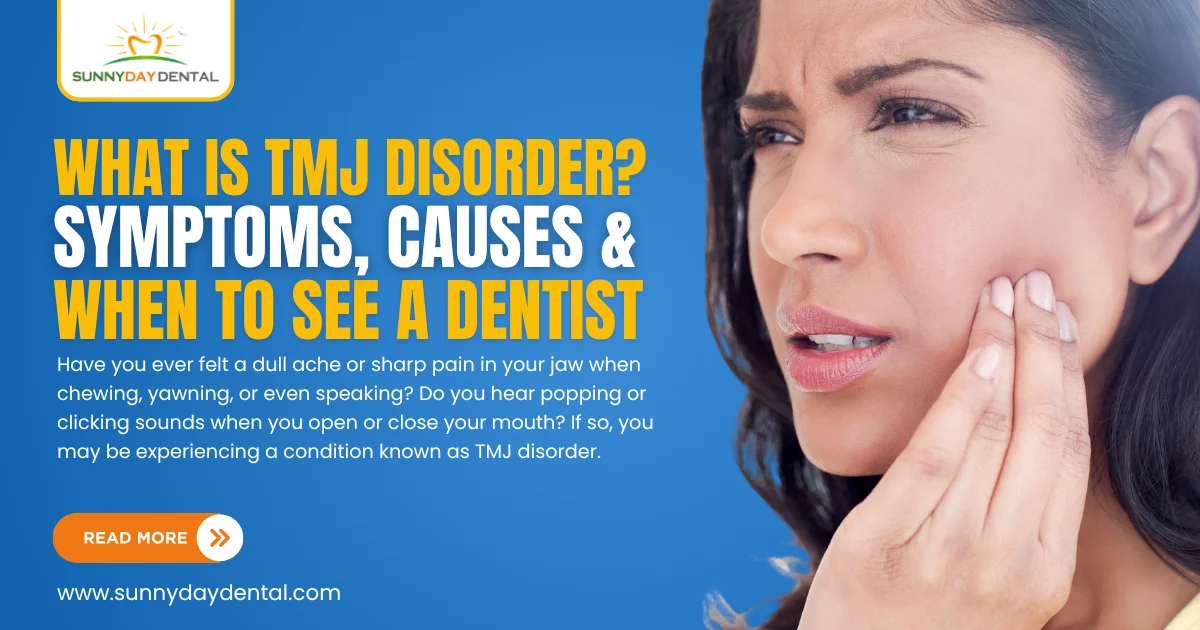Have you ever felt a dull ache or sharp pain in your jaw when chewing, yawning, or even speaking? Do you hear popping or clicking sounds when you open or close your mouth? If so, you may be experiencing a condition known as TMJ disorder.
Table of Contents
ToggleThe temporomandibular joint (TMJ) connects your jaw to the skull and plays a vital role in daily activities such as eating, talking, and facial expressions. When this joint becomes misaligned, inflamed, or strained, it can result in discomfort or even debilitating pain. This guide explores everything you need to know about TMJ disorder, including its symptoms, causes, and when to seek help from a dentist for jaw pain near you.
What Is TMJ Disorder?

TMJ disorder refers to a group of conditions that cause pain and dysfunction in the jaw joint and surrounding muscles. It affects the temporomandibular joint located just in front of the ears, where the jawbone connects to the skull. This hinge-like joint allows for smooth jaw movement.
While occasional jaw soreness can happen due to stress or overuse, chronic pain or restricted movement may point to a more serious underlying issue needing treatment.
Why It Matters
Ignoring TMJ symptoms can lead to worsening discomfort, chronic headaches, difficulty eating, and even long-term joint damage. Early diagnosis and proper care from a dentist in Woodbridge can restore function and significantly improve your quality of life.
Common Symptoms of TMJ Disorder

The signs of TMJ disorder vary depending on the severity and cause, but the most frequently reported symptoms include:
- Jaw pain when chewing or speaking
- Clicking, popping, or grinding sounds in the jaw
- Facial tenderness or pressure around the ears and temples
- Stiff or “locked” jaw muscles
- Pain radiating to the neck and shoulders
- Difficulty fully opening or closing the mouth
- Frequent headaches or migraines
- Earaches or ringing in the ears (tinnitus)
These symptoms may come and go or persist over time, affecting your daily routine. If you’re noticing any of these signs, especially jaw pain when chewing, it’s time to consult a professional.
What Causes TMJ Disorder?
TMJ disorders can develop due to a combination of factors, often making diagnosis and treatment unique to each individual.
6 Main Causes of TMJ Disorder

1. Jaw injury or trauma
Accidents or direct blows to the jaw can disrupt the joint’s alignment.
2. Teeth grinding or clenching (bruxism)
Chronic grinding puts excessive stress on the jaw muscles and joints.
3. Arthritis (Osteoarthritis or Rheumatoid)
Inflammatory conditions can affect the cartilage and bone structure of the TMJ.
4. Misaligned bite or jaw (malocclusion)
Uneven pressure from an improper bite can lead to joint strain.
5. Stress and anxiety
Clenching the jaw during times of emotional stress is a common trigger.
6. Genetics or joint hypermobility
Some individuals may be more prone to TMJ issues due to inherited joint flexibility or conditions like Ehlers-Danlos Syndrome.
What Is TMJ Disorder and How Do You Know You Have It?
TMJ disorder is a condition that affects the jaw joint and surrounding muscles, causing pain, stiffness, and popping sounds. Signs include jaw pain, difficulty chewing, and clicking noises when moving your jaw. If symptoms persist, consult a dentist to assess and treat the issue.
How to Get TMJ Pain Relief: Treatment Options That Work

Finding effective TMJ pain relief starts with a professional diagnosis. At Sunny Day Dental, we offer a range of treatments tailored to your needs, severity, and underlying causes.
Non-Surgical TMJ Treatments
- Mouthguards or Nightguards
Custom-fitted devices reduce grinding and clenching, easing pressure on the jaw. - Physical Therapy Exercises
Jaw-strengthening and relaxation techniques restore range of motion and reduce inflammation. - Medication Support
Anti-inflammatories, muscle relaxants, or low-dose antidepressants can ease pain and muscle tension. - Cold or Heat Therapy
Alternating ice packs and warm compresses can soothe soreness and improve circulation. - Stress Management and Behavioral Therapy
Relaxation techniques, biofeedback, or counseling help reduce jaw clenching caused by stress.
Advanced or Surgical Treatments
For chronic or severe TMJ disorders:
TMJ Surgery (Rare cases)
Procedures like arthrocentesis or joint replacement may be considered when other treatments fail.
TMJ Injections (Botox or Corticosteroids)
Helps reduce muscle tightness and inflammation.
Orthodontic Adjustments
Braces or dental appliances can correct bite alignment over time.
When Should You See a Dentist for TMJ?
It’s normal to experience occasional jaw discomfort. But if your pain is persistent, worsening, or interfering with eating and speaking, it’s essential to consult a dentist for jaw pain near me.
Visit a Dentist If You Notice:
- Jaw pain lasting more than a week
- Trouble chewing, speaking, or opening your mouth fully
- Clicking or locking the jaw
- Pain radiating to your face, neck, or ears
- TMJ symptoms alongside tooth grinding or bite issues
The sooner you seek care, the better the outcome. At Sunny Day Dental, our team uses modern diagnostics and patient-centered care to provide long-lasting TMJ pain relief.
Why Choose Sunny Day Dental for TMJ Treatment?
As a leading dentist in Woodbridge, Sunny Day Dental takes pride in offering comprehensive care for TMJ disorders. Our experienced dental professionals assess your symptoms using advanced digital imaging and personalized treatment plans.
We treat the root causes of TMJ disorder, not just the symptoms, helping you regain comfort, function, and confidence in your smile.
Struggling With TMJ Disorder? Sunny Day Dental Has the Solution

Your jaw health is too important to ignore—TMJ issues can disrupt sleep, eating, and everyday comfort. At Sunny Day Dental, we treat the root cause, not just the symptoms.
- Jaw pain or popping while chewing? Don’t ignore it.
- Get gentle, expert TMJ treatment that lasts.
- Trusted care from your local dentist in Woodbridge.
- Book your consultation today for lasting relief.
FAQs on TMJ Disorder
1. Can TMJ disorder cause ear problems or dizziness?
Yes. Since the TMJ is located close to the ears, inflammation can lead to symptoms like earaches, pressure, tinnitus, or even dizziness and balance issues. These signs often confuse patients, which is why a dental exam is important for accurate diagnosis.
2. Is TMJ disorder permanent or curable?
TMJ disorder can often be managed successfully, especially when caught early. While some chronic cases require long-term care, many patients experience full relief with non-invasive treatments such as nightguards, physical therapy, and stress management.
3. Can chewing gum worsen TMJ pain?
Absolutely. Constant gum chewing keeps the jaw muscles engaged and can aggravate inflammation and stress on the joint. If you’re experiencing symptoms, it’s best to avoid repetitive chewing actions until the issue resolves.
4. Will TMJ disorder affect my teeth?
Over time, jaw misalignment or grinding caused by TMJ can wear down tooth enamel, create bite problems, and lead to cracked or sensitive teeth. Proper treatment can protect both your joint and your dental health.
5. Can I treat TMJ at home without seeing a dentist?
While simple remedies like jaw exercises or ice packs can help temporarily, untreated TMJ disorder can lead to long-term damage. A dentist’s evaluation ensures the right diagnosis and safe, customized treatment.


